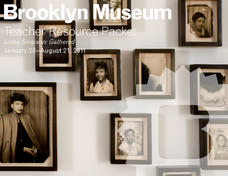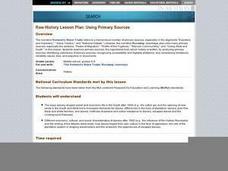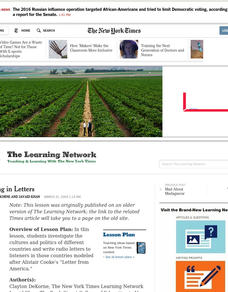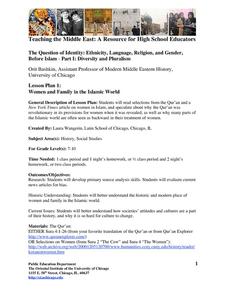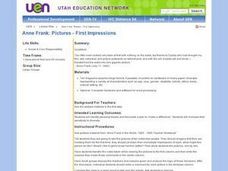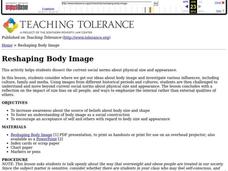News Literacy Project
News Goggles: Tracking Developing Stories
A 28-slide presentation introduces viewers to the process reports go through to track and verify developing news stories. Using the reports of the attacks at Atlanta, Georgia, massage parlors as an example, viewers are taught what to...
Anti-Defamation League
“They Don’t Know Me”: Exposing the Myths and Establishing the Facts about Immigration
Middle schoolers engage in a lesson that teaches them to distinguish myths from facts about United States immigration. Class members take an immigration quiz, watch a "What Would You do" video, and discuss how they could be an ally to...
Anti-Defamation League
Should Washington's NFL Team Change Their Name?
"What's in a name?" Is it irrelevant, as Juliet suggests in Shakespeare's play, or is nomenclature deeply significant? Young scholars weigh in on the debate by examining the controversy over the NFL's Washington, D.C. Redskins. Groups...
Curated OER
The Study of the Spanish-Speaking People of Texas: Understanding Primary Sources
Students analyze Russell Lee's photo essay as a sign of segregation in Texas. They consider the differences between primary and secondary sources and how historians use these sources.
Curated OER
All's Fair in Sport And Competition
Students design a physical activity contest or game that has no cultural or gender biases which includes an assessment that ranks competitors according to the competitors abilities. They participate in and evaluate the newly designed...
Brooklyn Museum
Lorna Simpson: Gathered
Lorna Simpson is a photographer who has put together a collection of photos from the 1950s in order to challenge the idea that primary source documents are objective in their portrayal of history. Learners are introduced to Ms. Simpson's...
Curated OER
Independence Masks
Young scholars explore how art reflects the economic, political, social, religious and historical concerns of a culture. They research a former colony to determine if there is any history of a mask. Students create a mask representing...
Curated OER
Communication Skills
Young scholars practice and model good listening skills, become aware of the effects of cultural and other biases that affect communication.
Curated OER
I Am More Than You See
Students examine their personal interests in culture/ethnicity and what they value in terms of physical vs. Personal characteristics. They discuss the forces in society that cause gender discrimination.
Curated OER
Ethnic Family Life
Eleventh graders examine the impact of the gold rush on different cultures. In this American History lesson, 11th graders examine the reasons for ethnic diversity in the west.
Curated OER
RAW HISTORY: USING PRIMARY SOURCES
Students analyze the ways slavery shaped social and economic life in the South after 1800, how slaves forged their own culture in the face of oppression; and the role of the plantation system in shaping slaveholders and the enslaved.
Curated OER
What Happened to Slaves When their Owners Died?
Young scholars analyze last and testaments of former slaveowners to identify and explain economic, social and cultural differences between the North and the South leading up to the Civil War.
Curated OER
Reporting in Letters
Students investigate the cultures and politics of different countries and write radio letters to listeners in those countries modeled after Alistair Cooke's "Letter from America."
Curated OER
Pre-Columbian Native Peoples and Technology
Students explore Pre-Columbian native cultures. In this Exploration Era lesson, students define the words "primitive," "civilized," and "technology." Students consider the connotations of the words and then investigate misconceptions...
Curated OER
Propaganda
How does word choice affect the reading of a text? Compare two headlines that were written about the same event. Is one biased? Discuss how word choice often reveals the author's feelings about a topic. Then look at different techniques...
School District of Palm Beach County
Timelines
What do BC and AD mean on a timeline? What is the difference between a decade and a century? Here is a nice handout that offers all the foundational knowledge your young historians will need on how to look at historical timelines.
University of Chicago
Women and Family in the Islamic World
How does the Qur'an detail the role of women? What modern social issues are linked to Islamic law? Address these questions with your young historians through close analysis of primary and secondary source documents.
Curated OER
Anne Frank: Pictures - First Impressions
Fourth graders identify personal biases and formulate a plan to 'make a difference. They, hopefully, increase their sensitivity to diversity. Groups of students view photographs of different people, and share their first impressions.
Curated OER
Reshaping Body Image
Students view images and write responses based on their impressions. In this body image lesson, students brainstorm how body image is influenced culturally and participate in a small group discussion on these influences. Students view...
Curated OER
COMING TO AMERICA: THE NEW IMMIGRANTS
Students become involved in the process of interpreting history by looking at primary source documents. This promotes critical thinking skills and comprehension of concepts and their relationships to different time periods through...
Curated OER
Humor and Anthropology/Ethnic Humor
By posing controversial questions about racially charged words and jokes, this presentation explores the function and use of ethnic humor. Sure to inspire debates and discussions in your sociology or anthropology class, the slideshow...
Curated OER
Living Together as One
The ultra-glamorous Muppet, Miss Piggy, launches a study of discrimination and ways to develop a more inclusive community. A series of videos and activities raise awareness of discrimination and journal prompts asks participants to...
Curated OER
Infusing Equity by Gender into the Classroom: Those Ancient Greeks
High schoolers compare the treatment of men and women in Athens and Sparta. In this gender roles lesson, students research daily life in the Greek cities and create charts that compare the lives of women and men in both of the cities.
ReadWriteThink
Critical Media Literacy: Commercial Advertising
Commercial advertising—we can't get away from it, but do we realize just how often we are being advertised to? With this lesson, scholars analyze mass media to identify how its techniques influence our daily lives. Learners browse...
Other popular searches
- Examples of Cultural Bias
- Personal and Cultural Bias
- Cultural Bias in Literature
- Cultural Bias Advertisements
- Cultural Bias Strategies
- What Is Cultural Bias
- Gender and Cultural Bias
- Cultural Bias K 6







